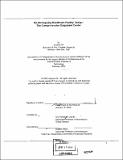Re-strategizing healthcare facility design : the comprehensive outpatient center
Author(s)
Oh, Jooyeol, 1973-
DownloadFull printable version (11.24Mb)
Other Contributors
Massachusetts Institute of Technology. Dept. of Architecture.
Advisor
Ann Pendelton Jullian.
Terms of use
Metadata
Show full item recordAbstract
During the past decade, medical facility design has gone through enormous change not only because of new health care management system but exploding technological advances in diagnostic equipments and fast communication system. New imaging equipment is now, better, smaller, less noisy. And digitized image results can be transmitted through the high-speed cable to multiple locations. In addition, robotics is changing the surgery suite organization. On the management side, hospitals are pressured to cut down their cost as much as possible in order to maintain the market share in today's ever changing health care environment. My thesis ,in the first phase, focuses on identifying some of the important factors that are affecting the current hospital organization: "Computerization, telemedicine, digital imaging MRls, CT and PET scanners, ultrasound, and lab and surgical equipment will make existing technology obsolete." (Health facilities Management Feb. 1997, 18-22). These changes have already prompted many reactions in how to reorganize or renovate the existing facility so that hospitals not only can accommodate the current changes but also possible changes in the future; the issue of flexibility, changeability is the key underlying concept. Next phase of my thesis focuses on arriving at organizational strategy recommendations and its models. Some of the important strategy concerns are; rationalization of circulation which brings design that requires less staff(efficiency), emphasis on integration of similar functions that are caused by the new technology, issue of providing the maximum flexibility and changeability to the new organization, new relationship between the departments, offices, labs etc. Information Technology with digitized information such as imaging results, patients' access to their comprehensive medical files in their room or any place in the hospital, and other aspects of telemedicine is an important changing force in the future of hospital organization that will be examined. With all the research, my thesis will recommend the organizational strategy and exemplary design of comprehensive outpatient care facility.
Description
Thesis (M.Arch.)--Massachusetts Institute of Technology, Dept. of Architecture, 2002. Includes bibliographical references (p. 56-57).
Date issued
2002Department
Massachusetts Institute of Technology. Department of ArchitecturePublisher
Massachusetts Institute of Technology
Keywords
Architecture.